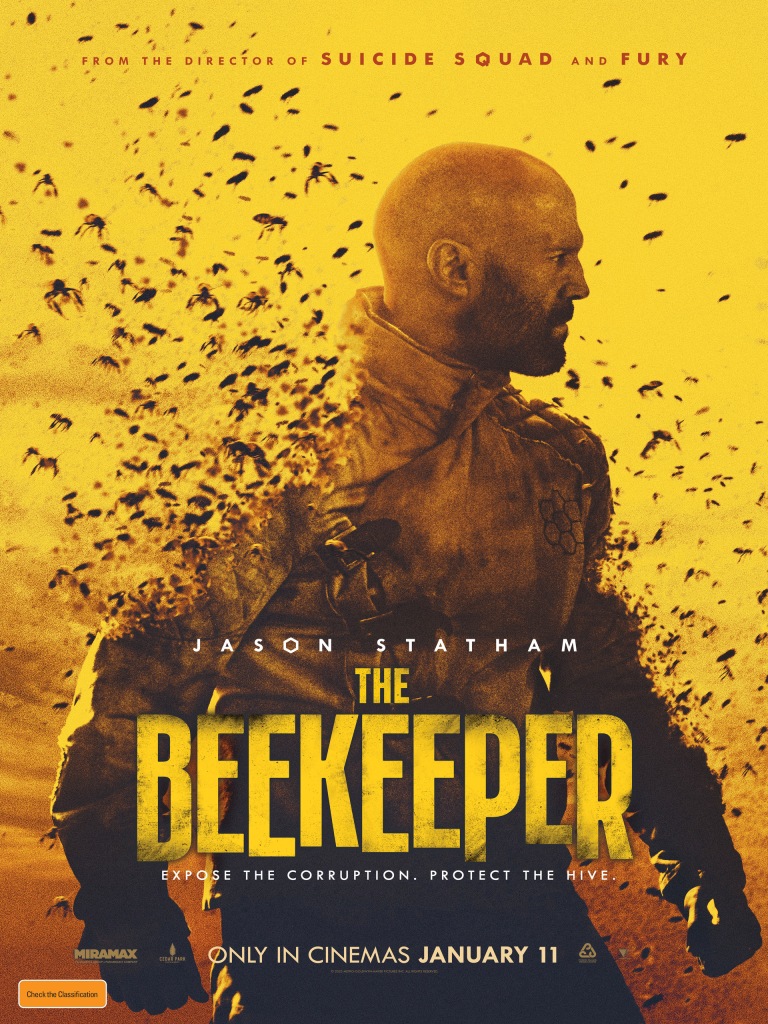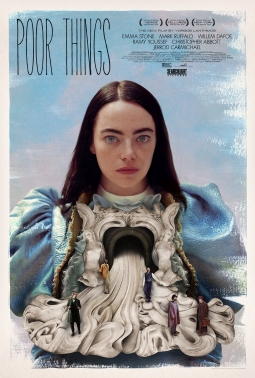The Beekeeper fails to land in large part due to a patriotism that feels strangely mismanaged. It is dissimilar to a movie like Top Gun: Maverick because those themes become a distraction rather than an incidental framing (or fun metaphor for being the last movie star) because of how poorly they’re woven into plotting and dialog. The performances feel unbalanced in a way that feels like a writer-director problem rather than an acting problem, especially when you know the actors in question. For people that enjoy every action movie (or every Statham action movie), there is much here; for people that love action movies in a more discriminating manner, there are better places to spend your money and time.
I will credit that the film is not totally bereft small joys. The horror-adjacent kills are fun to see set up and executed and it is not remarkably ugly if also not especially beautiful. Jason Statham’s ability as an infiltrator is entertaining, as is the idea that an Englishman was the top U.S. spy assassin. The film is in some parts a copy-paste of John Wick plot points and scenes and, for the audience members skeptical of the film’s FBI propagandizing (there’s a standard-issue complaining about suspected criminals having too many civil rights when you know they’re guilty scene), it at least picks an easy-to-hate villain and social issue premise: the film follows, in addition to Statham’s titular ex-government murderer Adam Clay, the FBI agent daughter (Emmy Raver-Lampman as Verona Parker) of an elderly woman (Phylicia Rashad as Eloise Parker) who clicks on a phishing scam and has her life savings and the funds of a charity she administers wiped out.
Therefore, The Beekeeper gets us all onside very quickly because phishing, data mining, scamming, and identity theft are among a rash of problems across the internet and cellular technology that the government is unable (read: unwilling) to do anything about. Regardless of the accuracy of the movie’s idea of who is behind those scams, it is interesting that they chose to link these crimes to the super-wealthy who explicitly in the film decide elections. Most impressive about all that, though, is that Josh Hutcherson gives arguably the most committed and convincing performance of any actor as douchebag tech billionaire heir antagonist Derek Danforth. I mean, Jeremy Irons (his head of security, ex-CIA director Wallace Westwyld) is always bringing gravitas to low- and middle-brow projects, but I was disappointed in the writing for both Rashad and Raver-Lampman (who has a lot of very bad on-the-nose observations), both of whom I hold in generally high esteem. Bobby Naderi (Verona’s partner Agent Matt Wiley) was a capable scene partner and affable work husband.
Now, this *is* a rampage revenge movie. We don’t necessarily *need* the premise to be tied into social ills. And you can in fact get away with just shallowly dipping your toe into them. However, when you escalate the issue to the point of how tightly capital controls the government and the tight intertwined nature of the relationships between, for instance, the CIA and the tech world, you can’t pull your punches and make the great beneficiary of this corruption an innocent billionaire politician who didn’t know any better when several scenes right before set the character up as also villainous; it doesn’t feel like an exciting surprise but a gutless letdown. The Beekeeper posits that data mining is good as long as it is in service of tracking suspected terrorists rather than defrauding people; there are no questions as to methods, just ends. I mean, I don’t expect it to come out and say that the intelligence community at large exists to help maintain a status quo of international resource extraction to keep America rich and working Americans sufficiently content with our treats that we never notice or think to act on the deprivation and exploitation all around us. After all, it isn’t the closing scene of Three Days of the Condor.
I just think that when a film has within it certain assumptions about America’s place in the world that do not contribute to plot or characters or vibe and instead distract from those things to create a background image of American heroism that is in fact at odds with the general plot and its more interesting points, and this background image is furthermore built up by careless and artificial dialog, that is worth examining. We’ve gotten to a place where enough of our political identities are wrapped up in critiquing the things we consume, and many of us are so estranged from actual political action that we only know to judge people or objects by their vibes, that post-Trump there’s a real problem of dismissing these examinations or critiques rather than sitting with them. There have without a doubt been some reaches among the critiques and there have been, more to the point of the problem as far as aesthetic quality is concerned, a great mass of works that don’t rhetorically aim to disrupt neoliberal capitalism or neo-imperialism so much as critique its facets at surface level in the realm of professional class grievances while petitioning for a more racially- and gender-diverse ruling class. I suppose the fact that the President in The Beekeeper (Jemma Redgrave with the least believable line I’ve heard on screen yet this year) and most of the FBI brass we meet (as well as the agents we follow most closely) are people of color, women, or both, contributes to the cultural placebo panacea of diverse oppressors. Sinister work in service to an agency that surveilled and infiltrated the civil rights and Black Power movements and is implicated in the murder of multiple movement leaders, or accurate representation of the ability to recruit from the oppressed?
The film isn’t a polemic against monopoly capitalism, but what critiques it does have it undermines because David Ayer just loves America so much and believes in its institutions so strongly. The film is sort of pathetic, really, though I like to imagine it’s where Jason Statham drove off to after he left his single scene in Fast X. Go watch one of Statham’s Guy Ritchie movies instead (or, like, Crank or The Transporter or The Italian Job or the actual John Wick movies).

